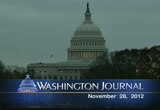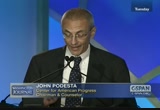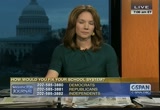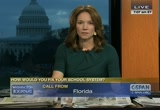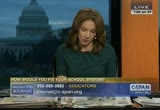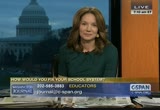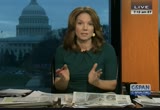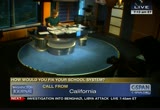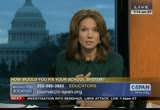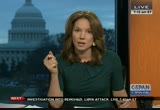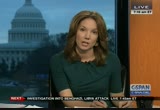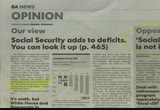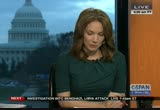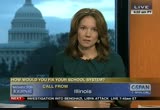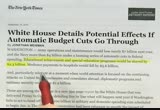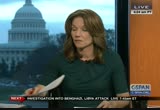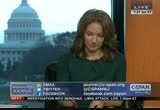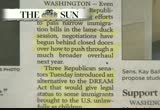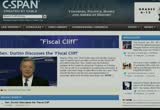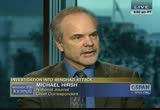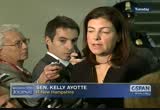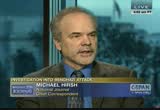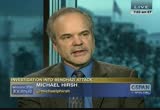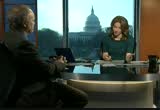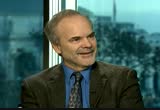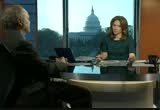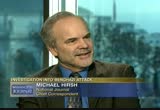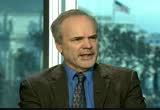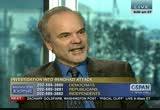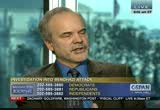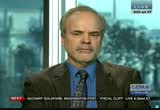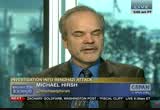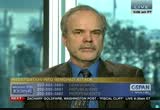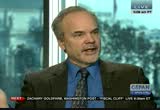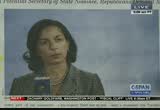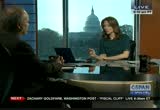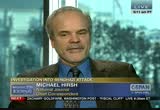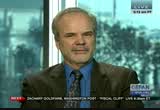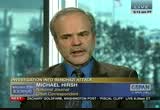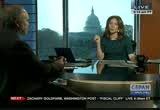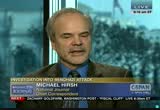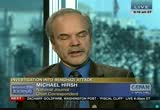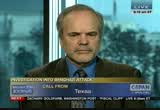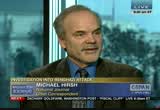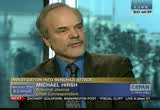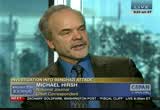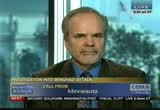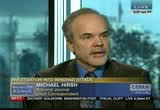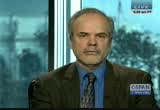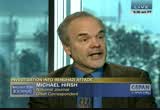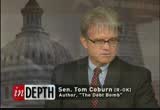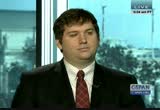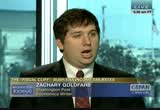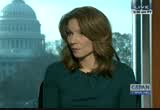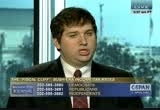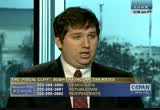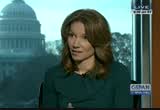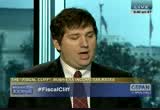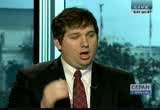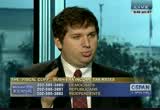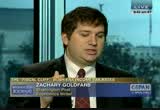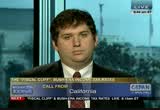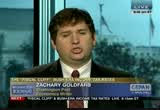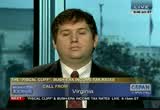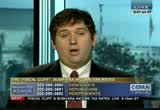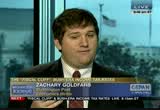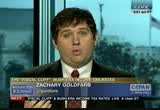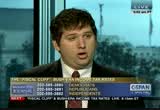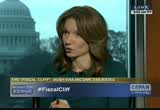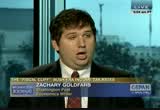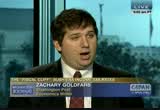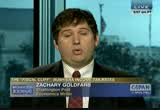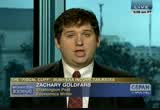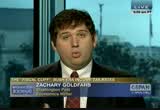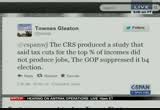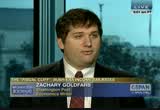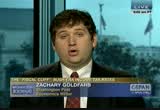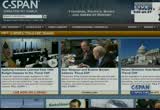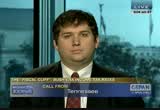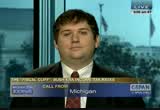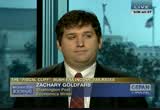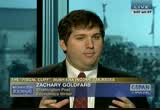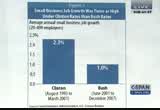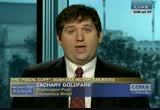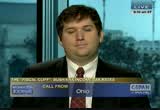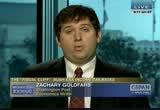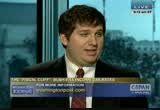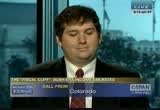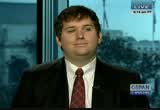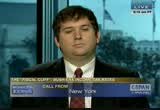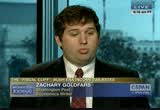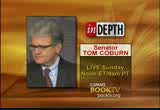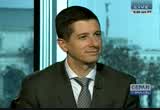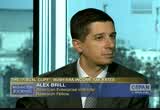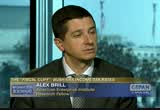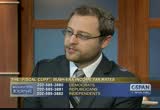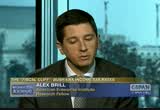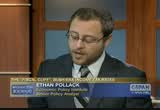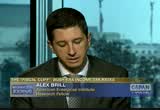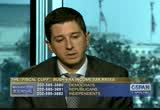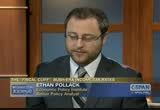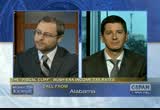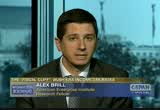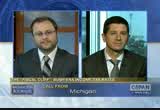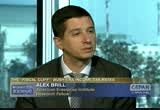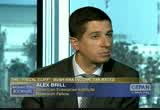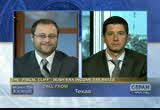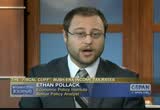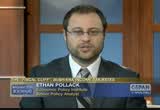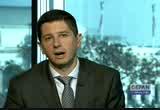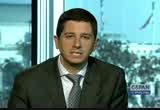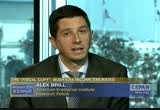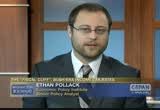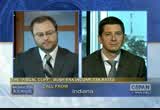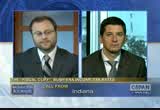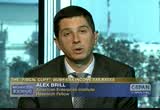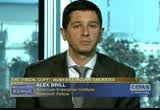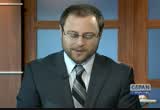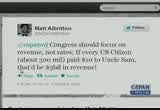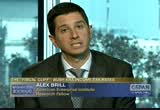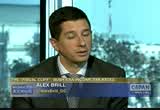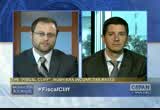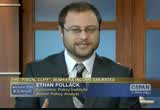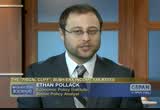tv Washington Journal CSPAN November 28, 2012 7:00am-10:00am EST
7:00 am
we will be joined by zachary goldfarb. our guests will also include alex gilb. "washington journal" is next. host: good morning and welcome to the washington journal. makers are in washington for the remaining weeks of the lame-duck session. the president is taking his ideas on the road to meet with the public. the white house says toy manufacturer is would be hard hit. republicans are planning meetings with small business owners across the country to force the president to back down on raising taxes on the wealthy.
7:01 am
former florida governor jeb bush is gathering policy experts and dedication leader's fourth annual education summit. we covered yesterday's events pick. that's where we begin. mr. bush says the unions are barriers to better schools. how would you fix your school system? we want to get your take on it. also, send us a tweet, post your comments on facebook, or send us an e-mail. we begin with the "washington times headline" -- we want to show you what the former florida governor had to say at yesterday's event. [video clip]
7:02 am
>> we need to have a teacher evaluation system that is based on teachers being professionals and not part of some collective trade union bargaining process. we have a system to reward teachers based on an industrial and unionized model that is completely inappropriate for the 21st century, completely inappropriate. there are incredibly fine teachers that get paid less even though they are doing the lord's work consistently over time and there are teachers that are mediocre that get paid more because they have been there longer. long did it is not the determining factor of success in the classroom. we need to make sure that we provide all sorts of resources for teachers when they are struggling to be able to assure that more than a handful of their kids get a year's worth of knowledge in a year's time. but we should have no tolerance for when there is abject failure. host: from the "washington
7:04 am
who is a little bit more from yesterday's events. [video clip] >> there is an economic need and a moral obligation to insure our students have equal opportunity and a tv outcomes they need to succeed. we cannot forget to return to this foundational principles to check what we are doing against the ultimate goal of creating a student center education system. what does that require? it requires an accountability system that ensures students achieve at the highest levels
7:05 am
and that action occurs when those levels are not reached. it requires a teacher and principal work force rigorously trained, highly skilled, and comprehensively evaluated and supported to improve. it requires a funding system that is fair and equitable, not the one we have today where kids who need the most help get the least. it requires extensive learning time and greater learning opportunities so students who are behind catch up to their peers to make sure all students get a well-rounded education that prepares them for the century, not the last one. certainly it requires the entire system that supports innovation and, embraces technology and reform rather than hindering them. it still requires a strong federal role in achieving those goals. host: the washington times reports that he has emerged as a key democratic voice in education differereform.
7:06 am
we will turn to all of you now. tim in gainesville, florida, a democrat. how would you fix your schools? caller: good morning. the first thing we need to do is the unions and the community, they need to come together. whenever i hear these discussions, i never hear about where the ptsa is or what about the students? it's my understanding in chicago that the teachers wanted to have more treatment programs and things like that, physical education, things of that nature. what we need to do, and i always talk about this, we need to have a situation that occurs where we go back to teaching some of the things we used to a. i was in ninth grade i was looking for taking consumer math. i cannot take it by the time i got to the 10th grade and it was
7:07 am
something offered to seniors. so we don't have civics education. the former governor did a program on c-span where he talked about his granddaughter cannot even get a decent physical education as opposed to what he got in the 1950's. -- civics education. the purpose of the education and should not be to make as much money as you can. the purpose of education is to take the world as we find it and make it better. host: you believe there is still a role for unions in education? caller: absolutely. for wanting, but teachers are representing the students as well as the community.
7:08 am
but we need to have more transparency. we need to have parents involved and we need to have the students involved at that level. by having all the voices heard, then we know more of what people need. host: randall in west palm beach, florida, republican caller. caller: my kids are in high school. many of the kids, african- american especially, want to do well. one of my kids is in an honor program and there's only two african-american kids. there's a lot of pressure by their peers that they do well. they are put down and are called uncle tom. their own people don't support them. and their parents are not involved. it seems the system of the kids is holding them back from achieving what they really want to do. host: is this a public school?
7:09 am
caller: yes. it seems they have all the opportunities other kids have, yet their own peers put them down if they are in an honors program or something like that. it does not encourage them to excel. many of them are very bright. the majority of the kids in my son's honor class are oriental, whiteclassand hate -- white, and haitian children because their parents require them to do well in school. host: independent caller in wyoming now. caller: one of the greatest riders this country ever had said i never let my schooling interfere with my education. back to the primary school system, and i think it's equal responsibility between the parents, the student, and the teacher. absolutely equal responsibility. host: gordon, the first recalls
7:10 am
mentioned parental involvement. this is from the "washington times" -- what you make of that, gordon? caller: sounds like an opportunity for the parents. host: it said the labor unions are opposed to the idea. caller: sounds like an opportunity for them to start cooperating with each other. host: so you think it forces forces their hand.
7:11 am
caller: yes. host: now to our next caller. caller: corporate media is the root of all our problems. they are misleading the public constantly. the idea that you would have rich shareholders deciding which information the american public perceives is crazy -- the american public receives is crazy. second, the format that c-span uses, we never have a democrat and republican -- elected democrat and elected republican debating an issue so the public can see it all in one nutshell. or even get to see over a bottle. you never had anybody rebut. because you are the echo chamber for the gop. let me get to the schools. nobody has been talking about
7:12 am
jobs. jobs are the reason most kids go to school, to get a job. and they go get more schooling to get a better job. i know we want to live in a fantasy world where it's you want to be smart -- no,. they invest in themselves to get a return on that investment with a job. we have had 30 years since the reagan administration of supply- side economics. we have signed free trade agreements, no tariffs, their shipping jobs overseas. and we wonder why students don't go to school, because they know they cannot get a job. we have sent the dollar overseas. the older people and sold out the young people. now they claim it is the young people's all, they don't want to learn. host: i will leave it there and go back to what you said about c-span. we do have roundtable discussions from the democratic perspective canada republican perspective at the same time, often on this show. we have had members of congress,
7:13 am
a democrat and republican, sits down and debate. in our last hour of today's show we will be turning our attention to parts of the so called "fiscal cliff" negotiations. today we are focusing on the bush-era income taxes. we're having a roundtable discussion in our last hour from a democratic and republican perspective on that. so stay with us. madeleine in thousand oaks, california, republican. caller: i am the wye fire the teacher. i feel i am an independent republican. -- i am the wife of a teacher. in california we feel we have too many administrators. the teachers need time to get further education and that should be demanded. there are teachers who should not be there. but there are parents who are
7:14 am
very aggressive who come to school and have come on the playground and have hit the teachers. the teachers have insurance if something happens. one student came to school with her mother is underpants. it's not only the military that get tempted, but teachers get tempted also. host: we have a line set aside for educators this morning. we want to hear from them as well as we continue this discussion on how you would fix your school system. yesterday in washington recovered an event with florida governor jeb bush. he has an education foundation that heh startedthate held its fifth annual summit in washington, gathering policy experts, the likes of condoleezza rice and other folks were here talking about how we can improve education in this country. recover the entire event yesterday.
7:15 am
if you want to go to our web site , c-span.org, you can find the speeches. we showed you a little of what bush had to say as well as john podesta, one of the democratic leaders, on education reform. we also posted this on our facebook page this morning. here are a couple comments -- if you want to put your thoughts on our facebook page. in other news, on the fiscal cliff talks, i want to show you the headlines and what is happening in washington. we told you at the top, the negotiators are going public. president obama will go outside washington as well as republican leaders to press their case to the american people what they want in the stocks.
7:16 am
but here's the baltimore sun this morning with the headline -- yesterday recovered to the speech that he gave. he says to put everything on the table. that's what the number two democrat said yesterday. if your interested in watching the whole thing, go to our video library. and the new york times reporting this this morning --
7:17 am
so that is the latest republican who has talked about breaking the grover norquist pledge on taxes. also, this morning, ceo's meeting with president obama yesterday, business leaders meeting with republicans as well. toth sides gathering ceo's talk about what they would like to see in the fiscal cliff tops. and in the washington post editorial -- also, "usa today" says -- you can look it up on president
7:18 am
obama's budget page 465 that it's added to the deficit, they say, and it needs to be part of the deficit. the opposing view of durban says social security is not in a crisis. back to our question for our viewers. how would you fix your school system? david in kansas, an educator, republican line. caller: i just want to say i am an educator. i'm not republican. i would make education a completely free market good. i would get rid of compulsory school attendance. --would get rid of taxation a i think you need a wall that separates the government and education, just like we have a separation between government and religion. host: ok.
7:19 am
june in wisconsin, independent. caller: hi. you know, the baby boomers got the last excellent, well-rounded public-school education. it was based on the basics -- proper english, writing. for whatever reason, somebody decided -- and i saw a teacher wrote an article on why we have to write all these rules in english, such as "i before e" in english. i thought, are you kidding me? for some reason somebody said, "whatever you think it is, and johnny." it's ridiculous. there's nothing wrong with people understanding if you get
7:20 am
down english, you can learn anything. they are deliberately dumbing down these children,. they talk about higher standards, but they're not getting the children the skills to meet the higher standards. the teachers are not the enemy. unfortunately, they are being portrayed as the enemy. they're not getting the proper respect from the children like they used to. i know that at the time you went to school, you were not nasty to your teacher, because your parents would not stand for it. now the teachers, we don't need more teachers, they say. there's something very wrong. it is clear to me, some poor parents cannot afford to send their children to whatever the last guy said. we need to get real and get back to the basics. if they get the answer rana, a market with a red pen. somebody says you cannot use red because of their self-esteem. host: is "the huffington post"
7:21 am
-- the report notes the importance of high-quality teachers and strong education recruitment. there's no clear correlation between higher pay and better performance. there are no magic bullets. it says that a growing money and education by itself rarely produces results and individual changes to education systems rarely do much on their own. respect of teachers, good teachers are essential to a high-quality education. finding and retaining them is not necessarily a question of taipei. instead, teachers need to be treated as the valuable professionals they are and not as technicians. it also says coulter is one area that can be changed.
7:22 am
the cultural assumptions and values surrounding the education system do more to support or undermine it than the system can do on its own. using a positipositive elementss culture are important for promoting successful outcomes. parents are neither impediments nor saviors and to education. education for the future and not just for the president. this is a global report put out by the firm pierson, if you are interested. lindsay next in chicago, illinois, democrat. caller: thanks for taking my call. i just wanted to make two comments. the funding of the schools, the disparity. i was a bus driver and had an opportunity to see what went on in the affluent areas in the city of chicago. because it's based on real estate taxes, the funding, never
7:23 am
being able to have the same opportunities. those kids have laptops and can take them home. but there's not even a computer in the class rooms within the city of chicago. my sister is a principal in the system. i asked her one question that would be critical to making the situation better for the students, she said to bring back the resources to the school in order to help the parents in dysfunctional houses that are underserved with 20% unemployment and we would get a more conducive environment and for the children to learn so they could be more prepared for school and retain what they learn in school. 14,: here's the september 2012 article puts out by the white house -about the effects of the potential cuts that will go into place on december 31 if no deal is struck over the fiscal cliff. the automatic spending cuts, defense and non-defense.
7:24 am
in the report, educational achievement and special- education programs would be shaved by an 2.3 billion. this was written in september. in "politico" there is an opinion piece by the person who serves on the education board, president of the national school boards association and member of the board of education in kentucky. he writes -- so a little better about money and this conversation we're having this money, ties into the
7:25 am
fiscal cliff talks, because defense and non-defense spending, automatic cuts take place if no deal is reached. so we are turning to all of you outside washington this morning. how would you fix your school system? natasha in macon, georgia, an educator. caller: yes. host: what are your thoughts? caller: schools need to allow various ways of teaching. a very rigid process where we are looking for one out, but not allowing different ways to teach multiple varieties of students. host: what does that mean? you have to teach in a certain way because of testing requirements? caller: i mean because of learning requirements. sometimes teachers teach because they want to teach a certain type of way, like they want to lecture or they don't want to change their teaching -- or they want to change their teaching style because the children have
7:26 am
different home languages because of their culture. you have to take more things into account. i do think teachers could be more artistic in their interpretation of the standards. that should be supported by administrators. host: give us an example of artistic? caller: i like to use dramatic arts in my teaching a lot of times duty to a particular standard. i may have students to act it out, create a scene, create a rap or poem. sometimes you look at that and teachers may be afraid to allow pop culture into the classroom. but you have to engage students in order for them to learn. a lot of times, education feels learning should not be fun, it should be rigid and all facing the same way. that's what i mean by allowing more out of the box thinkers to help educators and it should be sanctioned by people that don't
7:27 am
have the talent. a lot of times people that are not artistic are afraid of artistic people and out of the box concept. host: what grade do you teach? caller: i worked as a career evaluator apsa technical college and i'm a ph.d. student. host: so you are about to start your day? caller: yes, ma'am. host: now to nancy, a republican caller. caller: my biggest problem i see is discipline. my daughter is a deaf education teacher. she has to spend half a per day disciplining the kids. discipline is a big problem. second, she does not have time for lesson plans. she takes it home. she holds down two other jobs. so that's another problem. teachers are not given enough time to prepare, lesson plans, that kind of thing. third, government has too much involvement. they need to have the community
7:28 am
more involved. parents and teachers, that kind of support. i don't feel we have enough say in our school systems. ofy say it's because government rules or a law against this. i think we need more community action. host: we will stick with this conversation for another 15 minutes, but i need to give you some other news in the papers. usa today, the front-page story, looking at the housing market. and in the financial times -- overseas, here's the world section of the washington post --
7:29 am
this was after a report of possible poisoning reviving suspicions abound his debts. and president obama meeting yesterday with mexico's new president who will take over on saturday, meeting at the white house. try to boost relations between the detonations. and the front-page of the washington times, but it's in many of the papers this morning, angry protesters filling tahrir square in cairo. they're stepping up pressure for their president to rescind a decree that they say threaten the nation with a new era of autocracy. there's the picture on the front page of the washington times. we will be talking about this on
7:30 am
sunday on the washington journal. back to the phone calls. john in san jose, california, independent. caller: thanks so much for having me. good morning. i have a really good friend who's a teacher at a high school we attended when we were in high school. one of the things she complains about the most is just how rigid the system is. really, i think it's ironic that we continue to say teachers are important, although teachers for the most part are not in charge of their own profession. the system should be a little bit more organic in the sense that if a teacher has a great idea she can rally real talent her or him. the other of thing i wanted to
7:31 am
share is there's a whole system within the system that provides individualized education plans to students who have special needs. this is ironic, because really every student should have an individualized education plan. when you are a very bureaucratic system, it's hard to do that. really, the system should be much more organic, there should be much more freedom in starting new organizations that feed unique communities and respond to individual learners as opposed to mass groups of people. i would like to suggest your viewers to check out john taylor [indiscernible], an author who's done a lot of research about the background of our education system. then you would see where the system comes from and why it's the way it is. host: jeff in florida, democratic caller.
7:32 am
caller: i called about education, but since you blended in the fiscal cliff and education into the program, i have two remarks. first, the primary education in grade school, and through age 12 is where we should concentrate the most effort. most of the efforchildren that i know have no note-taking skills. their english and mathematics is terrible. they're not prepared for junior high school or high-school and that's where they fall off the cliff. its most important that the primary education have proficient in order to go further into junior and senior high school. host: when it is important in a primary education? caller: reading, writing, arithmetic, basic note taking, being able to sit in a class and not only listen to what someone
7:33 am
is telling you got a couple be able to put it into a notes so that you can then review them. most children don't know how to do that. host: at what level do you start doing that, the note taking, in order to remember, what level? caller: starting in the beginning, from the first grade, teach children how to take notes. teach them how to be able to put the information down at the same time they are taking it in. most students fall behind when they are trying to write every word and the teacher says and things like that. host: where does that come from as far as making sure the basics are taught in primary levels? does it come from the state government or the federal government? caller: from the schools, a basic teachings from the teacher, whether it's the federal government --
7:34 am
host: i'm asking do you need a mandate that says you have to do this? caller: that is political. who knows? to get to my second comment about the fiscal cliff, i would like to chastise the reporting, including your program, for not saying the obvious. according to one of the a renquist republicans, the amount of money that is given away, and i'm not calling it a tax cut or increase, to the richest 2% is $80 billion a year. in order to create a new job where a person makes a taxable income of $34,000 per year, that person will pay $8,000 a year. that is 10 million jobs. you would have to create 10
7:35 am
million jobs just to break-even. why someone cannot point out the obvious, on your programs and bring this up into conversation, it befuddles me. host: you are saying that you cannot tax enough? caller: that's not the question. it's a question of fair play. the bush tax cuts, which i really called the republican tax cuts, are giving something away. wes not an increase to say, said it was temporary and now it's done. it is giving something away. when you do that, you have $80 billion a year that we're not collecting that we used to collect. host: we will stick to our conversation, but tune in, because we're starting a series every day focusing on the fiscal
7:36 am
cliff tops. today we begin with the bush-era tax cuts, just focusing on the income tax cuts. we will talk about what you have raised, is how much revenue they bring in and so on. that will be during our last half of today's washington journal starting at 8:30 a.m. eastern. as i read earlier from the piece about the number two leader in the senate durban, he did say we cannot be so naive to believe just taxing the rich will solve our problems, so put everything on the table. we covered that. so go to c-span.org if you want to watch sporting. sticking with congress, next to that story in the baltimore sun, lawmakers tried to move the immigration issue forward.
7:37 am
so this is part of the conversation that's going on, on capitol hill, over a larger immigration overhaul legislation. back to the fiscal cliff tops, for a page of the new york times, says president obama and republican leaders are not the only ones going on a road show over the fiscal talks. now simpson-bowles will be coming to a city near you. they will be traveling around talk about what they have proposed and what the two sides need to do in order to come up with some sort of grand bargain. we will be following these fiscal cliff talks on our web site, c-span.org/fiscalcliff, to find events we are covering related to the fiscal cliff as well as a twitter area that
7:38 am
follows the discussion as well as a resource area for links and documents related to the fiscal cliff talks. you can follow it every day here until a possible deal is made between the two sides. also, on congress, "politico" is reporting this morning that the republicans have put forth house committee chairmen that are all men for the 113th congress. not a single woman will lead to any of the major house committees, starting in january, for the new congress. back to the phone lines. james in california, an educator. caller: hi. i have listened to a lot of the comments. something important is being missed. how was on a school board five years. i have two kids in the school district. it is parents' responsibility.
7:39 am
they don't have the knowledge base to help their children. there's a lot of different reasons for that. public education accepts as a reality and goes on to say it is poor children. the way the system works, it was built in the stone age.the monks had to stop their education. that was to bring in and the crops. the kids would lose so much of the information they gained. in the school district has to go back to reeducate the kids again. what i tried to suggest, a british did not go over well, is you need to go to a system where you have where you teach the kids and test them immediately. by the time a school district get information back, there's nothing they can do with information to actually help the child.
7:40 am
vinita nair give it one day and the next day you know where the child is. you should give it one day and then the next day you know where the child is. this way you have maybe five times a year you can bring the child back up to speeds, get them back in with the class. host: what kind of resources would that require? caller: a change of thought, mainly. unfortunately, teachers are not really used to dthis type of schedule and parents are not used to this type of schedule. administrators and teachers want three months' vacation and so do parents. possibly it interferes with sports programs. but nobody says it is a bad idea as far as educating the children, because it's not a bad idea.
7:41 am
these children need constant input. the parents don't have the resources. there's a lot of different reasons. nevertheless, they don't have the resources. the school district has to accept that fact. we should try to educate the parents, but in the meantime we have to, with a system that will help the child. the only system that has been shown is continuous education, ongoing continuous education with an ongoing feedback system. if the child is falling behind, you need immediate remedial, not wait until the end of the year, until you are failure. host: the wall street journal front-page reports this story --
7:42 am
some have called this the next economic bubble. in other news, senators to block any clinton's successor, the headline in the wall street journal, referring to susan rice going to capitol hill yesterday to meet with senators john mccain, lindsey graham, kelly ayotte. she will be back up there today to meet with other senators. the deadline from yesterday's meetings is that those three are still not satisfied. kelly ayotte says she will try to block the conversation of susan rice or another nominee to succeed the departing secretary of state clinton until more information is given on the benghazi attacks in libya. also, france to go in favor of bid.tinians's u.n.
7:43 am
the french government said it would vote in favor of the palestinians ' bid of non- member status. how would you fix your school system? we have a couple minutes left. larry in jackson, mississippi, independent. caller: good morning. newly appointed superintendent, i met with yesterday. we have 30,000 students and 2000 are homeless. 70% of our schools in the city, i visited alternative schools
7:44 am
where we had the bus driver and security guards running the alternative schools. we have teachers who are failing these students and failed those students' parents and grandparents. they've been in the school system's 25 for 30 years. we accept this. we fired a coach at southern university yesterday because they went 0-12. how is it we led 75% of our students fail and we continue to retain the same principals and teachers? 76% of our schools in jackson need to be charter schools. this is the only outlet that i see for the future of our children in jackson, mississippi. host: let me throw this into the mix before we go. schools install a tracking system despite protests. ships pinpoint location of students.
7:45 am
7:46 am
spanish. we pay tax dollars for the school system to work. if we take our children out of school and don't allow our children to go to school, the federal government says they are going to lock us up for child abuse. however, if the congress and the senators or our politicians want to take the money away from federal schools or from the school systems, why don't they stop and think about something. you cannot law you cannot have one allowing them to do something and another that takes it away. we have a federal law that says mathilde are to be in school and be taught. if you are going to take the money away from schools, why do the politicians want to allow their own rules and
7:47 am
regulations to be violated? i don't know what some people would call that, but i would call that treason, where people want to turn around and make rules that are strictly on political bases. host: thanks for all the phone calls. next, we turn our attention to susan rice's visit to capitol hill yesterday and the latest on the benghazi investigation with michael hirsch. later, our first installment in the multi-day series looking to specific policy areas on the fiscal cliff. today we are taking a closer look at the bush-era tax cuts and whether or not they should be extended. we will be right back. >> ♪
7:48 am
>> washington worked his way up, went to harvard law school, and at the urging of one of his brothers, he immigrated southwestern illinois to where the lead mine industry was in its heyday. he arrived after a month journey by ship, by stagecoach, by train, and arrived in this muddy mining town, boarded himself in a log cabin, established a law practice from a log cabin, and then slowly worked his way up and became a very successful lawyer in the town and got involved politically, ran for congress, served 8 terms.
7:49 am
and then he befriended abraham lincoln, who is from illinois, then ulysses s. grant, and as they were on the rise, he watched the them and stayed with them and as a close confidant during the civil war. after grant was elected president, he initially appointed washington as secretary of state. at that time washburn became very ill. his family feared for his life. after about 10 days for the submitted his resignation to president grant. so grant regretfully accepted his resignation. over the next several months he regained his health, which was always very fragile. he regained his health. so granted then offered him the position as minister to france, ambassador to france. >> researchers and officer michael to go on washburne, the
7:50 am
only diplomat from a major power to stay during the siege of paris, providing political and humanitarian support. sunday night debt 8:00 eastern on c-span. >> "washington journal" continues. host: michael rich, chief correspondent with the national journal to talk about the latest on the benghazi attacks, susan rice, her possible nomination to be secretary of state. -- michael hirsch. she spoke with three senators about her nomination. guest: she had a meeting with john mccain, instagram, and kelly ayotte, all republicans who have been the chief skeptics about her potential nomination as secretary of state, almost entirely based on what they see as withholding or a distortion of information about the attack
7:51 am
in benghazi on september 11 that cost the lives of the u.s. ambassador chris stevens and three other americans. -- john mccain, lindsey graham, and kelly ayotte. it is a meeting to try to appease your critics. after she came out of the meeting, it appeared to their opposition to them had increased. if the president intends to nominate susan rice as a successor to hillary clinton as secretary of state -- and most indications from the white house are that the president wants to go ahead with it -- it will be an interesting standoff. host: let's hear what kelly ayotte had to say, republican of new hampshire. they met with the secretary. [video clip] >> i want to say i am more trouble today having met with
7:52 am
the acting director of the cia and ambassador rice, because it is certainly clear from the beginning that we knew that those with ties to all khyber were involved in the attack on the embassy and clearly the impression that was given of the information given to the american people is wrong. -- we knew that those with ties to al qaeda were involved. they knew by the 22nd that the information given to them was wrong, yet they have not cleared that up with the american people to date in saying they were wrong, including the president of the united states. host: the new hampshire senator went on to say she will block any clinton's successor, because she wants more information about the benghazi attacks. what is next on that front? since an individual
7:53 am
senator can put a hold on a nomination. that could prevent this from going forward. we have seen this in previous cases. if we saw this in the bush and administration would john bolton. we have seen it in a couple of cases in the obama administration where nominee for a high government post was held up for a long time. it all depends in the end on whether kelly ayotte gets any allies from her fellow republicans on this, because the way you could overcome her individual opposition is to get about five republicans that the democrats would need to break any filibuster that she might muster. i suspect, based on what i've seen of the evidence, what she was referring to in the statement, that it probably will not be a big problem for susan
7:54 am
rice nonalignment. frankly, ayotte is way out on a limb on this. it is interesting that john mccain and lindsey graham, much more experienced senators, continue their opposition. but ayotte says she will hold up any nominee. host: what to you mean that she's way out there? guest: there's no one else making statements that there are so many unanswered questions that this is a sort of national scandal that must be resolved before we can even have a secretary of state to succeed hillary clinton. i think that unless there are more senators willing to stand with her on this, she will eventually be forced to relent. she does not have the experience on foreign policy. host: in this wall street journal era, it says the administration may have erred.
7:55 am
there are different ways of treating the politics on doing that. you could argue that going in preemptively was a better course in some respects. the idea of a susan rice nomination is still something of a trial balloon, because the president has not said definitively that he wants to make her secretary of state. so this was sort of testing period to see if she could survive. at the same time, no one in the white house has denied that she is his favorite candidate. it could have gone on either way, frankly, yesterday, or at some point after he had already nominated her. host: newspapers are reporting susan rice will be meeting with
7:56 am
susan collins of maine and senator bob corker of tennessee, who is in line to be the ranking republican on the senate foreign relations committee, which will hold confirmation hearings for secretary of state nominees. these three republicans would need more republicans to come to their side to block susan rice's nomination. what do they need? guest: i think they need to make a case that she's not qualified to be secretary of state. we have not heard that case. one of the ironies of the benghazi probe and the way it is being linked to susan rice is not just that she had very little to do with benghazi at all, other than being out on the sunday talk shows on september 16 when she was the designated spokesperson and was reflecting on what the intelligence community had concluded a to
7:57 am
that point, which was not where they ended up later on. that is what the republicans exercise, that there was a shift. it was a shift purely in the intelligence assessment and they are merely killing the messenger. this is a woman who has a very impressive resume in many respects, a rhodes scholar, intellectually brilliant, but with a long track record going back to the early 1990's with the clinton administration, in a senior position on africa who has spoken out on many other issues and has been a clean key player for a long time. there's a lot about her record that should be examined prevents the whole point of the confirmation hearings. so i think this exclusive focus on her being a spokesperson for one day on benghazi is a little off kilter. host: you wrote a piece.
7:58 am
the stock into her record a little. let's delve into her record. guest: she has said herself the most formative experience she had as a public official was in 1994 when she and anthony lake, the national security advisor to bill clinton, advised against any kind of intervention in rwanda as the genocide was going on. bill clinton later said after its presidency was over that this was the worst mistake he had made. apparently it was worse than monicagate. we had 800,000 tutsis killed in a terrible event. for the clinton supporters this was not long after bill clinton had just been hadby the
7:59 am
after billown -- clinton had just been embarrassed by the blackhawk down incident. for susan rice, that shaped a lot of her approach to africa. in the second clinton term she became assistant secretary of state for africa, which is a very powerful position. the secretary of state does not generally pay a lot of attention to africa, so she was in a real position to deal with the aftermath of the genocide. there are questions about the types of relationships she formed with key players like paul kagame, leader of rwanda, and whether or not she looked the other way when he was aiding and abetting rebels in the democratic republic of congo, which is where the real horrible conflicts occurred post-rwandan
8:00 am
genocide. there are serious questions that should be raised any susan rice confirmation hearing about how she handled it world war, a terrible event that went on for more than a decade. she had a big hand in that. right up until the present there are questions about whether she blocked or delayed a u.n. report on how rwanda has aided and supplied this rebel group accused of atrocities. this group has taken a city in the democratic republic of cong o and there are issues about how we handle these players. there are issues about susan rice and where she stands on
8:01 am
intervention and use of force. bob corker, who you alluded to before, is an important player and is emerging on the foreign relations committee, and stated that the biggest problem he had with susan rice was that she did not question anything president obama wanted to do, and one could argue that is what the secretary of state is supposed to do, but going back to 2007 she was the primary 4 and adviser to barack obama. there is real loyalty there. it is not surprising that the president has been forthright in suggesting he wants her to be secretary of state. these are the kinds of questions that should be in focus. host: it is noted that no one
8:02 am
should underestimate how close president obama and susan rice are. guest: that is true. there were three main foreign policy advisers to president obama from 2007 through 2008. there was into the lake, the clinton -- anthony lake, the clinton adviser, and a white house lawyer that came over from the clinton camp to back obama. susan rice was the one that he leaned on the most. in fact, i was somewhat surprised at the beginning of the obama administration that he sent her to be the u.n. adviser because there was speculation she could be national security
8:03 am
adviser. i do not think people thought she would the secretary of state then. it was interesting to me that the president was calculating enough to send his closest adviser to new york where even though she was an important -- in an important post, she would not be in the inner circle. perhaps he felt she needed four years of further maturing, but not all is ready to make her his primary person. host: david bienick dayton, ohio, democratic -- david, a dayton, ohio, democratic caller. caller: i want to get to benghazi. the host country must prevent mission from intrusion and damage. how could susan responsible, whether she had the information
8:04 am
right or wrong? are the senators supporting or advocating the invasion of a sovereign nation to protect an embassy against the geneva conventions? guest: i did not think they are advocating that. there are questions about why there was not better security in benghazi in what some have called a fog of war situation because it was relatively soon after the toppling of muammar gaddafi. you head factions contending for power in libya, a weak government, and not the situation of a stable country that is supposed to be protecting your embassy and then the sea facilities. those are -- and embassy
8:05 am
facilities. those are legitimate questions that are being addressed in various investigations. it is obviously a serious issue. my main point is that i do not think it has very much at all to do with susan rice, who as president obama pointed out, her only real connection to this terrible incident was that on one designated day she was sent out to give the administration's position. host: what kind of investigations are going on on capitol hill and how many focus on susan rice and benghazi in particular? guest: there are some congressional panels, with the main one being the homeland security panel led by joe lieberman.
8:06 am
joe lieberman was close to john mccain. he has broken with mccain on this issue. he had a meeting with her yesterday and thinks she told the truth about what happened and does not have any issue with that. there is an the guy going -- investigation going on the fbi investigation going on, and i suspect questions -- fbi investigation going on, and i suspect questions about security, and why chris stevens was in the gaza without better protection -- again, those are separate -- benghazi without better protection -- but again, those are separate questions.
8:07 am
host: north carolina. republican. you are next. caller: i think this susan rice thing is a smokescreen. you have somebody that is an ambassador and rehearses talking points, and she does not question or analyze the information, whether it is true or not. the cia says they knew this was a terrorist attack within 24 hours, and days later she is voicing the same thing, as well as president obama. consequently, it looks like the whole problem goes about her. i am a retired captain in the navy. if you do not have leadership and take responsibility, everything goes into disarray. when did the president now what
8:08 am
was the -- know what was going on, and who gave the order for that story to be announced as far as it been an attack based on a video. there is a smokescreen going on. host: david, in a statement put out yesterday, they said in the meeting the talking points were incorrect in a key respect. they say intelligence community, but there is speculating if it was the fbi, the cia. do we know? guest: i spoke to various intelligence officials, and i do not think it is that complicated the circumstance --
8:09 am
complicated. the circumstance was complicated, which is why the assessment was off, but there was the initial assessment of the protest in benghazi, happening at about the same time protest in cairo and elsewhere were happening over this anti-muslim video that was cited by the administration. susan rice was sent out with that assessment. she also said they believed extremist elements were involved and that was the best information they had. that was accurate. a couple of weeks later, the office of the national director of intelligence, clapper, his spokesman came out and said we were wrong, there was no protest. so, what happened was the assessment went from being "we
8:10 am
think there were protests and extremist groups might have exploited the moment and attacked" and then it went to this was not even a protest. the fact is this was a really tough, fob gulf war situation, without people -- fog of war situation without people on the ground. it was not entirely clear, and indeed it is still not entirely clear who these extremist elements were, and there was a possibility that the protest were connected in that extremist groups that launched the attack were inspired by what they saw on television happening in cairo. the mistake was pretty straightforward.
8:11 am
host: and nathaniel asks from twitter, is it possible that the delay was supposed to be misleading so that agents could remain in the field in libya? guest: that is possible, but i do not know if that would be especially related. when republicans have been focusing on since before the -- what republicans have been focusing on since before the election is did the obama administration distort what they knew to play down the idea that terrorists were involved because one of the president's talking points where that he defeated al-qaida. did they want to keep that from the public who would come to the conclusion that al qaeda is still here. there is just not the evidence
8:12 am
to support that. these are not political appointees. these are people that say we took a long time to figure of what happened, and our assessment changed in one major respect, we decided there was not a protest and it was an organized attack. susan rice is being made to pay for that change of assessment. she was not in a position, frankly, before going on those shows to do an independent assessment. host: gary and twitter says she been sent out with limited information. judy, independent caller. caller: good morning.
8:13 am
i have questions we do not have time to cover, but i will begin with my question from the beginning, why was a our staff in libya not given the security to protect themselves that they requested over and over again? guest: that is the central question hanging over this investigation. it is an important one, and hopefully we will get more clarity from these various investigations. there are implications that diplomatic security requested additional personnel that they did not get. we do not really know the answer to that. again, that is not directly related to what ever susan rice did, did not do, or say or did
8:14 am
not say. so, as is the case when some fatal event happens like this, and it takes the life of a u.s. ambassador or anyone important, you will get an investigation that will probably result in different procedures. granted, this was an unusual situation, a post-conflict libya without an established government where security forces. you've had a breeze and bess, chris stevens, -- you have a brave ambassador, chris stevens, who knew a lot of people there. you had cia there. some of this might not come out, but it is a legitimate target. host: pennsylvania.
8:15 am
democratic caller. caller: she made a mistake. where were the republicans when the there was the intentional or about weapons of mass destruction -- warm about weapons of mass destruction that was not true? [inaudible] host: "the wall street journal" says the administration was surprised by the press conference the three republican senators said -- held because they say it did not match the tone of the meeting they had. officials noticed that the three
8:16 am
republicans stopped short and in the -- in the meeting and afterwards to blocking the nomination. guest: i do not know what is going on inside of john mccain 's mind. he has been a leading voice on national security for many years, and he also ran against barack obama in 2008 and there were harsh statements from the chief foreign policy advisor, susan rice, about john mccain, related to iraq, the support of the iraq wars, and made fun of him going on these fact-finding trips. we do not know how much personal enmity towards susan rice might be involved here. lindsey graham has often aligned
8:17 am
with john mccain on these issues. unless, frankly, we start to hear more republican voices on the senate side coming out against susan rice than we have heard, i do not see this as being a fatal problem for her. host: "the baltimore sun" notes the republican senators would need five republican votes to stop a filibuster of a new nomination. north carolina. go ahead. caller: my problem with all of this is it seems like they are trying to get to something else, and they are just weaseling to get to something
8:18 am
else. host: what do you think they are trying to get to? caller: if she went out there with the information that was given to her, and john mccain test not have the common sense to know that -- does not have the common sense to know that it was not her information but the information given to her, i would want to talk to the person that gave her the information. i would want to talk to the people that gave her the information. host: is that going to happen, michael hirsch? guest: that is going to be part of the investigations. why did the intelligence community come to the conclusions they came to, which was erroneous, that there was a protest there, and why did the
8:19 am
emphasize the protest over an organized attack? why was there in this meeting? we know a little bit about the context. this was september 11. a day where you might get a higher number of attacks. james clapper said there were more than 50 countries they were monitoring that day. this has to be seen as part of the context of what happened, but the caller is right. this should focus on who made the assessment, and why, not the messenger host: texas. you are next. caller: excuse my sore throat. i do not think susan rice should be given the job because she
8:20 am
hurts the prestige of her office because if she did not know it was misleading, she should have known that many people on the first evening suspected the attack. jay carney, or anyone of a lesser position in the administration, could have read the talking points. i know she was sent to do it, but she is a strong person. she was not forced to do it. guest: a lot of this is about the way intelligence gathering works. there were reports within hours of the attack on september 11 that various groups, a couple of them even named, affiliated with al-qaida, might have been
8:21 am
involved, and there was a facebook posting where one claimed responsibility. in the aftermath of 9/11 we also had false claims of responsibility. a lot of these claims and allegations that are investigated are part of what is called raw intelligence. the intelligence community does not feel confident making a statement until they finish the intelligence and cooperate the reports. some of -- corroborate the reports. some of this has been made worse, exacerbated, by irresponsible reporting by my colleagues in the media that have focused on initial reports, they knew within two hours but there was a group claiming responsibility, but that is not the point. how legitimate was the claim is
8:22 am
what needs to be assessed. by the time she was sent out to the sunday talk shows she is given talking points based on what they have. if you look at her statements, she talks about the protest, but also talks about extremist groups. there are caveats in her statements. i think there is a lot of smoke, and very little fire in terms of evidence that she or anyone else deliberately covered up with a new. host: amber on twitter says what crazy analyst invented the video theory is the greater mystery. caller: i want to remind everyone that the president came
8:23 am
out the next day and said it was an act of terrorism, and i also do not understand what the three senators are trying to do because they are beginning to look ridiculous. i do not know what happened, and we will learn more facts. they will get more information. it might be behind closed doors, and we might not know what happened, but we have to start and take, how many embassies were attacked when george bush was in office? nobody did anything about that. host: michael hirsh? guest: this was an unusual situation with the air of spring and this intervention in libya that the arab spring and this intervention in libya susan rice did have something to do with. she did say we needed to
8:24 am
protect benghazi when gaddafi's forces were threatening the people of benghazi, but that was one year or more before, and a separate issue of what happened in post-conflict benghazi. there are a lot of unstable events happening throughout the arab world in the aftermath of these protests that toppled one leader after another friend to me sierra -- tunisia, to yemen, to egypt. host: this is from maverick, who says republicans would prefer john kerry, freeing up space for scott brown. susan rice has degrees from
8:25 am
stanford and oxford. patty, republican caller. caller: i wonder if this gentleman is aware that cnn had no problem going into this embassy to find documents. it was deliberate that did not send in the fbi to investigate. this was right before an election, and this gentleman is not sure why it took so long? also, c-span should have done some in depth shows before the election. i am disappointed in how you protected president obama in comparison to the-shows when president bush was president. part of the problem in ameritech is -- in america is the media should put under their caption
8:26 am
white house stenographer. there was also a laser with where the attacks were, and that is why he got killed. he was an absolute hero. guest: there is concern with talking points in the mainstream media, as it is called, but in my defense i have written very critical things about barack obama and his presidency over the last three years, and we try our best to be even-handed. host: rob. manassas, virginia. caller: what has befuddles me is the cia changing their assessment.
8:27 am
i do not have some of the facts, but you seem well-informed. would it not be simple enough to ask one of the survivors what happened? if somebody is outside of my house, i could see if they are having a protest or breaking on. this analysis on cia analysts in mclean, virginia, when they could just as someone what happened. i do not understand the confusion about what happened for so long after the event. guest: those are legitimate questions that should be the main focus of these investigations -- why did it take so long? they did interview survivors. people in those situations, if you are in one place, perhaps defending a facility, you do not always have a picture of the overall one of the reasons --
8:28 am
overall. one of the reasons after the susan rice appearance they did come out and say there was no protest was because they interview people on the ground and examine some of the video. why it took them that long, i am not sure, and it is part of a legitimate investigation that i think should go on. my only point is it is not related in any way to susan rice. host: david, connecticut. democratic caller. caller: i think mr. michael hirsh said the cia had their own facility there. if the cia was holding prisoners there, they would not want that story coming out?
8:29 am
guest: that is right. it has been denied that there were libyan prisoners held at what is believed to be this cia facility or a safe house, but we do not know the truth and we may never know it. host: lloyd, a republican caller. caller: i think they should stop focusing on susan rice, and focus on why i voted the way i did -- was the president aware of requests for additional security? i cannot believe the president of the united states is not briefed on hot spots and why the request would not have made it. let's forget about susan rice. the way i voted the way i did is i do not believe the president was not aware of it.
8:30 am
i believe the cover up takes place right there, and now because the president was reelected and i support him fully, he keeps saying focus on me, and that is what they should do, and if there is justice in the world there might be impeachment down the road -- down the road. guest: i did not think there will be impeachment, but the focus should be on obama. there was a tendency to some over-state the victory against al-qaida. one of his big talking points was taking out osama bin laden. there might have been the psychological tendency to play down the rise of new al qaeda- linked groups. the central question is why was there no better security supplied in this dangerous
8:31 am
conflict situation in libya. that is where the question should be, and he has said, after me, and that is what investigators should do. host: michael hirsh is with "national journal." thank you for being here. next, we turn our attention to income taxes with zachary goldfarb of "the washington then later we have to go economist and whether the income tax cuts should expire. first adopted from c-span radio. >> egyptian state television said the country's highest appeals court has decided to suspend its work nationwide to protest the decree to give the
8:32 am
president absolute power. they say they will not return to work and told president mohammed morrissey rescinds his decree. a vote on the status of palestinian in the u.n. has been supported. the measure requires a majority and is all but certain to pass. palestinians have been lobbying countries in order to present a consensus against israel. two thirds of the member nations have recognized the state of palestine. republican congressman tom cole, in a private meeting yesterday, urged colleagues to vote to extend the bush-era tax rates for all but the highest earners through the end of the year, and said he believes such a vote would not violate the grover
8:33 am
norquist anti-tax pledge and that he is not alone. he served in official posts within the party. the article says he might provide cover for other republicans. we will hear from grover norquist at kennecott -- at 10:00 a.m. eastern here on c- span. >> 16 or 17 basis, we have military-run schools, and the average cost educate a child per year is $50,000, almost four times with the rest of public education costs. -- what the rest of public education costs. we could take the money we're spending today, and pay every public school system $14,000 per child and save billions of
8:34 am
dollars per year with the same or better outcomes. host: this weekend you can talk with tom coburn -- >> this weekend to can talk to tom coburn on tv "in debpth." join the conversation with your calls, tweets an e-mail to comments -- and e-mail to comments. >> "washington journal" continues. host: we are kicking off our series today looking but the fiscal cliff negotiations, looking specifically at the bush era income tax cuts that were passed in 2001, 2003, and again in 2010 under this administration. joining me is the zachary
8:35 am
goldfarb of "the washington post." when did the tax cuts take effect, and why? >> the initially took effect -- guest: date initially took effect in 2001 and 2003, and the idea was to of the dual-fold. at the time, we had huge surpluses because of the strong economy over the 1990's and deficit-reduction plans put in place over the 1990's. the government had the choice to spend that on programs, or returned it to tax payers, and the bush administration decided to return the money to taxpayers. over the following year's tax rates were lower. it was renewed in 2010 in a tax deal between president obama and congressional republicans at a
8:36 am
time when the economy was weak and the feeling was they could not take an increase in taxes. host: what was the desired effect and did it happen? he called the desired effect was to give people more of their income back, and that happened, as wealthy people got more income back, more moderate income earners got some back. one of the questions is how it effects economic growth, and it is an unresolved area of economic research. did it did help the economy -- did it help the economy? it is hard to say. we had a good economy in the 2000's before the crisis. now we have a huge crisis.
8:37 am
on balance, it probably did not help that much. host: can you calculate if jobs were created? guest: you really cannot. no one has done a long-term view. you could say over one or two years what is likely to happen, but over eight or 10 years, economists struggle to come up with a tax policy affects the trajectory of the company. host: what will happen in january of 2013 if the tax cuts are not extended? guest: there are the bush tax cuts, which are the biggest part of the fiscal cliff. host: let's focus on the income tax cuts. what happens to those? guest: they go away and most americans taxes go up. for the average household it would be about two thousand
8:38 am
dollars more in taxes next year. for the upper income people it could be anywhere between $5,000.20000 dollars. -- $5,000 and $20,000. for lower-income, it could be a few hundred dollars. host: let's look to the existing tax brackets and what they are now. this chart shows taxable income if the taxes are extended, and then if they expire. given that, how much revenue it is the treasury expected to get if these tax cuts and the extended?
8:39 am
guest: about $500 billion the year, or about $4.5 trillion over the 10-year window. if we let them expire, we solve the deficit problem, but nobody likes the idea because it would largely be through tax increases on the middle class. if we do let them expire, we solve the deficit problem. host: just like that? guest: just like that, because it raises about $4.5 trillion because of the huge tax increases, with people paying more into the government. host: what if you only extend the tax cuts for those making
8:40 am
$250,000, of which," said yesterday, saint -- which tom cole said yesterday, then what are we talking about for revenue? guest: it is much more modest, and it would also have much less negative economic effects in the coming year because wealthy people have less marginal propensity to consume. they would be less likely to spend what they have. letting the tax cuts on the wealthy expire will have more modest effects and raise much less revenue. host: what effect to the bush income tax cuts have on the
8:41 am
average household? guest: for the upper quintile, it was a 5% or 6% increase in after-tax income. as you go down the income scale it was a little less at each stage. it was a notable amount. president obama's policy wants to reverse that at the upper- end and freeze it at the middle and lower-end. host: just to put some numbers behind what you said, the top - guest: that sounds right. what president obama is trying to do is reverse the tax cuts
8:42 am
for the wealthy and have their income taxes go up significantly, but freeze it for the middle class. he does not want to restore everyone to the former tax rates, andy idea is the began and the idea is that the top earners incomes have continued reject the idea is that the top earners and comes -- the idea is the top earners incomes have continued to rise. if you freeze taxes on lower income, and increase taxes on the upper income, you shrink the gap, and that is the purpose of his policy proposal. host: how many households actually make more than $250000? guest: about 3 million
8:43 am
households. 3 million people are about the talk to% of vernon's. the top 1% makes more than $600,000 a year. host: do policymakers agree on what defines the middle class and where it begins, income- wise? he called it is unjust in question because we know what median income -- guest: is an interesting question because we know what needy in income is tied average income is -- median income is. we call the middle class everyone making under two hundred $50,000 a year. you could slice it anyway you want. some argue you should be raising taxes on everyone making over $100,000 a year, $150,000 a
8:44 am
year. to a degree it is an arbitrary definition. the top three quintiles, you could design the middle class that way. it is a reasonable approach. host: let's go to phone calls. ken, california. democratic caller. caller: a lot of the argument going around is uncertainty, and republicans say it is uncertainty over tax hikes on the rich, but it is actually the demand side that is broken, not the supply side. dan mintz any move the government makes to take money out of the pockets -- that means that any move the government makes to take money out of the pockets of the middle income people will hurt the economy.
8:45 am
one third of the economy and economic problems are caused by lack of unemployment. so, if more money were spent on a jobs program, especially building roads, things that increase productivity, we would be much better off than giving tax breaks to the rich. so, i think the argument is skewed because we have a supply- demand economy, and it is the demand but is broken here. host: zachary goldfarb. guest: the most immediate problem is a continued lack of demand and economic activity which is leftover from the financial crisis and the recession, and there is a debate
8:46 am
in washington over whether you should address that now through additional spending measures. there are not many proposals to do that, but people like larry summers have suggested reviewing the payroll tax cut. in the context in the debate over the bush tax cuts, we have generated huge deficits, and we need to address that, and one way is requiring upper-income earners to pay, and the thinking is that allowing of upper- income taxes to rise would have less of an effect on economic growth or demand than letting tax rates rise on the middle class because they are more likely to spend based on lower taxes compared to upper-income people. host: ruby. virginia beach. independent caller. caller: i have always heard that
8:47 am
middle-class was about $250,000. i do not know what he makes, but i think that in new york if you ask anyone making that amount if they were wealthy, they would say no. the caller said something about no demand. i in 75 years old. i had seen us -- i am 75 years old, and i have seen as go from a producer society to a consumer society. we cannot exist as a consumer society. does the gentleman think that $250,000 is a wealthy? gee, i think it is extremely wealthy. if you make -- guest: i think it is extremely wealthy.
8:48 am
that is more than 90% of americans. of course, if you live in manhattan, that does not go along way if you need to send your kids to private schools or have a high cost of living, and of course people in manhattan make higher income than the median income, but for most people, $250,000 is a huge income. host: for those that make $250,000, what is their effective tax rate? guest: cannot answer that. they do pay for the most part what they're supposed to pay, but i can tell you that there is a great reduction in taxes paid by upper-income earners because of something in the tax code known as tax expenditures,
8:49 am
known as the mortgage interest rate deduction, and this only detects the top third of tax filers -- effects the top third of tax filers. they are able to reduce their tax burden considerably. if the best example was mitt romney who had an effective rate of 14% last year, when he made millions of dollars in investment income, and there are proposals, as warren buffett has, where people who make $1 million should pay 30%. host: the average tax percentage is about 10%. if you look it this chart here --
8:50 am
host: eric, rome, georgia. caller: i have an article here that says why congress will not tax the 1%. it tells you about the congressman. 261 are millionaires or billionaires'. the top republican, darrell issa, is worth $441 million. dick armey handed bush a budget for 10 years, and it squandered the surplus. what the article states is they will not raise taxes on the 1%. it is because they are the 1%.
8:51 am
host: use of the number in that article is -- you said the number in that article is 261. caller: are millionaires or billionaires'. guest: the caller makes a good point, that the wealth of people in congress has diverged from the average wealth of americans, and a colleague of mine wrote an article looking at this trend, as over the last three years the average net worth of members of commerce has grown extremely well. -- congress has grown extremely well. i do not know if they are motivated by their own income. i think it is more of a philosophical belief about what the appropriate role of redistributing income in this country is, and who should pay more. going back to what a previous caller asked about, democratic
8:52 am
politicians want to raise taxes on the wealthy, but they also tend to represent wealthier americans. in new york city, as the previous caller asked about, it is represented by democrats through and through but they would be heavily-hit by upper- class income tax increases. host: from twitter -- is it true that current revenue only -- interest pays social tree, medicare and medicaid, and the rest is borrowed? guest: it is true that the discretionary part of the budget, everything else, nuclear facilities, the justice department, education, is a small part of the budget. the question is not so much about now, but in the future.
8:53 am
in the future, medicare and medicaid spending, into a degree social security, will come to consume the entire budget because of the baby boomer retirement age -- wave and the increasing costs of health care. that is why lawmakers are working hard to get the fiscal house in order. host: we are talking about the so-called fiscal cliff talks happening in washington. if you want to follow along, we are starting a new page c- span.org/fiscalcliff, as well as a twitter feed. we are learning today that there are no face-to-face negotiations. republican leaders and president obama plan to take their arguments to the american people and directly and go on
8:54 am
what many are calling a road show. republicans are planning to schedule event with small business owners across the country, arguing that if you did not extend tax cuts for the wealthiest americans, those making more than $250,000, it will hurt small businesses. is that true? guest: hurt is a subject of word. it will effect small businesses. it will reduce the after-tax increase -- income of 3% of small businesses. whether that hurts them is another question. it could mean between $5,000 and $20,000 less. owners might still be taking home $110,000 in income, and there is some money left over to reinvest. on the one hand, it could mean they could not hire an employee,
8:55 am
by a new oven if they are a restaurant, or refurbish the lobby, but on the other hand you could say that they already make a large income. it is true that 3% will be effected. will it hurt them, yes, to some degree, but is that bad for the country? that is more a question of perspective and debate. host: this is an article from "the washington post." guest: there are a host of things that would happen if policy makers do not address the fiscal cliff. when is significant spending cuts, then the payroll tax, and the upper income tax cuts. of all the provisions, the cbo
8:56 am
found lead in the upper income tax cuts expire would have the least effect on economic growth, reducing employment by about 200,000, which sounds like a lot, but 200 million workers, it is not that much. as we mentioned earlier, wealthy people have less of a propensity to spend their increased marginal tax savings. they are not likely to spend money that the state because of lower tax rates, therefore money will not flow to the economy. host: from twitter, put money in the hands of those with high propensity to spend, additional income for the middle class, and the economy will start building. republican line. brandon. welcome to the conversation.
8:57 am
caller: we keep talking about the fiscal cliff, and the 1% being taxed more, but do we not realize that the reason we have these tax umbrellas for the rich people is because they are the ones building hospitals, donating five. million dollars to keep from having to did it to uncle sam, -- $500 million to keep from having to give it did to uncle sam, so the speak? when you add obama-care to the small businesses, you are looking at 50% of those businesses going out of business because they could not afford obama-care if you have 10 in please, you know -- employees, you know? guest: is true that wealthy people have a big function in charitable giving, and that is
8:58 am
why there is a concern about limiting deductions for charitable giving because there is a worry they will cut back on those deductions and that will hurt universities, hospitals and other charitable organizations. there are various ways to address that, including limiting reductions, but not getting rid of them. on the second question, it is also true that obama-care will impose some new burdens on businesses, but no data shows 50%-to-60% will be shut down, and in general could have shown it is a marginal increase in taxes and financial obligations, and there will be subsidies in the coming years to help smaller businesses in doing that. it does have some effect for companies that have trouble
8:59 am
offering health care, but obama- care tries to the fact that by easing into it. host: robert. independent caller. indiana. caller: the first bush texas, obama let them go because people need to get unemployment. this is another story. he will not let them slide. i'm telling you now, do you think that i am right, he was put over a barrel and this year he is not? host: ok. referring to 2010 negotiations. guest: in 2010 we had a fiscal cliff that was smaller, but on the tax policy cited was similar and we had on employment benefits ready to expire because we had a long term unemployment problem in the country.
9:00 am
in general benefits can only be used for 99 weeks. the president wanted to extend the benefits, and republicans said we're not letting bush tax cuts expire. the president has vowed to not let that happen again, but the caller is perceptive in that he will cause a problem with himself and that position because he might not be able to extend unemployment benefits for a lot of people. in general i think the president has more leverage because of the election qi -- win, and you see republicans splitting of this issue, but the fact that more middle-class people will be hurt is a constraint. host: our guest yesterday talked about the exploration of long-
9:01 am
term unemployment benefits. the top percentage of incomes cannot produce jobs. the gop suppressed before the election guest: it is true the they withdrew that report. the crs has made the statement of marginal tax rates do not connect well with overall growth. in the 1990's, we have higher taxes and greater economic growth. during eisenhower's presidency we had the lower tax rates -- we had different tax rates for the 80% or 90%. they only have 50 or 60 years of
9:02 am
modern history about this. it is hard to make conclusions either way. it is hard to understand how tax's impact the economy overall. host: the recent in nebraska. caller: i was wondering why grover norquist told the house republicans never to raise taxes. in the bible it says to give caesar what he needs. give god what is god's. i would think all of the elected officials would know what to do. guest: i'm not a biblical scholar, but it is not a religious discussion as much as it is a philosophical and moral discussion about what the high income people in the country go to a lesser income people. whether they owe anything.
9:03 am
there is a great philosophical debate about what people should contribute to prosperity. there is not a right or wrong answer there. i think grover norquist believes very strongly that higher taxes is a moral wrong, and economic wrong. he has held tightly to the position and has done very well for many years. now there seems to be some softening of the opposition. the binding seems to be coming loose. but it is probably too early to say whether grover norquist's sway over the republican party is over, or if it has been softened by new or republicans kurram we will find out in the coming weeks and months. -- and you were republicans. we will find out in the coming months. host: house members are holding
9:04 am
meetings today on the fiscal cliff. alan simpson and erskine bowles will be addressing the fiscal cueva. and president obama round 11:30 a.m. eastern time will be holding an event with middle- class americans who will be impacted if negotiations do not lead to some kind of grand bargain. look for coverage of all our guns on c-span.org. linda in tennessee, republican of kalla. caller: it was obama who said do not raise taxes. it was the democrats who voted to extend the bush tax cut. for years, we have heard them say tax cuts for the rich. now we find out there were also a tax cut for the middle class and the port. -- and support. -- the poor.
9:05 am
people who have never paid into social security or met -- or disability are getting on welfare. 16,000 a month are getting added into social security and medicare who have never paid a dime. host: linda, we are talking about the bush era tax cuts, focusing specifically this morning on the income tax cuts under the bush administration that were extended under the obama administration. that is part of a series that we are doing on the "washington journal" lead starts today that focuses on different aspects of the so-called fiscal cliff tops. and we will go to michael next in fenton, mich.. good morning. are you with us? caller: yes. host: you are on the air, sir. caller: i'm calling to discuss the fact that the disparity in
9:06 am
the revenue that is generated in the different tax brackets, it is my understanding that the top 5% roughly makes $200,000 and ups -- and up. they generate the majority of the taxes that the government takes in. the other 95% probably takes in less than 40% of the revenue. guest: i cannot recall the exact statistics, but it is true that the top income this tradition pay disproportionately -- a hugely disproportionate share of the taxes. it is because they capture a hugely disproportionate amount of in hermine the company. -- country. -- of income in the country.
9:07 am
each side'stake argument. democrats are arguing that you do not extend the income tax breaks for those making less than 250,000, that hurts, middle-class americans. how did middle-class americans do under the mat -- under the clinton administration when taxes were higher? guest: they did actually quite well. and from the 1980's, middle income taxes did quite -- i'm sorry, middle class income did quite poorly. in the 1990's, they grew. host: under a higher tax rate, they grew? guest: pretax income went down and pose tax income grew a little bit more. the tax code is quite a critical element here.
9:08 am
tax policy is only a small part of the picture. the big picture is economic growth and whether economic growth is benefiting the middle person. that will account for whether people feel rich or four or in the middle, or whether they feel their economic fortunes are in better or worse. after tax policy, that will affect up somewhat. but the big question is whether the economy grows in a way that benefits people in their salaries and then they can make adjustments in the margins. they are important adjustments, like for deficit and debt. but the real question is, will their salaries grow before they pay their taxes? host: here is a comment. how did small businesses do under president clinton?
9:09 am
guest: relatively good economic policies left things good for everyone. host: logan in nebraska, democratic caller. caller: my question was on the tax increase. the tax increase for the top earners of the country, over $250,000, does this include businesses making $250,000, or just individuals who happen to have that much money in their bank account? guest: definitely not people who have $250,000 in their big accounts. it is household, and it can include businesses, that aren't 250 -- that earned $250,000 a
9:10 am
year or more, or an individual who earned $250,000 or more a year. it has to do with the amount of money that you make each year. and you are not taxed at a higher rate immediately at $250,000. it is only each dollar above $250,000 that you make that is taxed at the higher rate. if you make $250,000 per year, you will see no raise in your taxes. did you make $1 million a year, your taxes will go up significantly. for every dollar you make more than $250,000 you will be taxed at a higher rate. if you make $250,000 or below, you will have your taxes frozen under the president's plan.
9:11 am
host: next caller. caller: there is a lot of commenting that poor people are trying to avoid paying taxes and make the rich people pay all the taxes for us. the bigger problem i see is, the amount of money the rich people take out of the economy without allowing the lower income class is to get raises, and be able to pay more taxes. rich people just keep taking. there's not much left for the businesses to give back to the employees or to invest in the companies. and what do you think about this? host: i think -- guest: you basically make the argument for the president's tax policies. middle income and the poor have not enjoyed income growth in the past several years. the wealthy have and it is time to pay their share back.
9:12 am
republicans would say that they have to have buy-in. they have to have investment in the performance of government, or they will take the benefits without any understanding, without having to pay for those benefits. host: this is a story from the "washington post" this morning written by your colleague. this is another part of the fiscal clift talks. it is looking and dividends and the tax rate cut that was put in place under the bush administration for dividends. i want to get your take on this headline. what are these companies doing? guest: the value of a dividend is not how much the dividend is, but how much it is after you have paid taxes on the dividend. if the bush tax cuts are not extended, then the guy you of
9:13 am
the dividend will be next year what it is this year. -- then the value of the dividend will be different next year-and what is this year. many employees get their income in the volume of their dividends. host: this is considered income? guest: yes. host: ann in aurora, colorado caller: i want to bring up that ben bernanke and the federal reserve to start of a third round of easing in the financial sector, and from what i hear it is about $32 billion a month in buying toxic assets from the financial sector. they obviously enjoy their
9:14 am
stimulus. it is for congress, not the general public. the financial sector is the biggest part of the u.s. economy and it is where the most people learn more as -- most people turned to hundred $50,000 or more. -- earned $250,000 or more. it is unconscionable for me to think that these people are being asked -- are not being asked to be a little uncomfortable as far as paying taxes. and the compromise over health insurance, those are the programs that are the most efficient in the united states. they are the most expensive and that is where we need to focus our legislation to reduce the
9:15 am
overall cost of medicare and medicaid. thoughts.e are ann's last caller in delaware. go ahead. caller: i don't think we can rely solely on the exploration of the tax cut for the -- expiration of the tax cuts for the 2% of our revenue. what we ought to do is increase our employment so that we do not have an 8.9% unemployment rate. we have to stop exporting our jobs to places like china where 100 people will burn to death making 40 cents an hour because they could not get out of the factory. we have the triangle factory disaster here in 1911, over a century ago, which brought about changes in our employment, changes in our hazardous working conditions, and increases.
9:16 am
we ought to do that all over the world where we export jobs. host: we're running out of time. i will leave it there. it was our last force? goldfarb. go ahead. -- our last four zachary goldfarb. go ahead. guest: you do not want to hurt the economy, but you do want to start making progress on paying down debt. about theselking issues in the coming days, i assume. taxes are very part of that discussion. and you need more tax revenues somehow. the question is, should ever won pay a little more taxes, or should just the wealthy pay? -- short everyone pay a little more taxes, or just the wealthy? that is the question in the coming days before the end of the year. the white house will try to get as much out of a republicans on
9:17 am
taxes, and the republicans will try to give as little as they can on taxes. we probably will not find out until the final few days of the year. host: zachary goldfarb, thank you for your time appearance guest: thank you. -- for your time. guest: thank you. host: if you go to our website c-span.org/fiscal those plays cliff -- c-host:span.org/fiscal cldff. next it will have a roundtable discussion on the fiscal of. but first, in news update. >> patrick donahoe in remarks earlier today on cbs this morning said the agency must be allowed to use prepayments on the retirement health-care fun and allow general mail delivery on saturday. he said he thinks most people do
9:18 am
not realize that in his words, we are 100% self-sufficient. we pay our own way. but the postal agency is losing $16 billion this year. the epa is set -- is temporarily suspending bp from new contracts with the u.s. government. two weeks ago, bp agreed to plead guilty involving -- in its involvement in the death of a love and oil workers in the oil spill in the gulf in 2010. bp also agreed to lying to congress over how much oil was spilled. defense secretary leon panetta, along with the vice president's wife, dr. khiel biden, -- jill
9:19 am
biden, held a dedication at the vietnam memorial here in washington. it is expanding the planned scope of the center to include more recent service members. they must still raise $38 million for construction. those are some of the headlines on c-span radio on 16 bases in the united states -- on c-span radio. >> of 16 basis of states we have thousands of milton -- military schools. the average cost of educating a child is almost four times of what the rest of public education costs. and the vast majority of our bases, we use public schools. we could take the money we are spending today and pay every public school system at $14,000 per child and save billions of dollars per year. and with the same or better
9:20 am
outcomes. >> this week, you can talk with oklahoma senator tom coburn, about the fiscal cliff, the affordable care at, and the future of the republican party. join the three-hour conversation with your calls, facebook comments and tweet. that is on c-span2. host: welcome back to the last hour of the "washington journal" as we continue our look at the bush era tax cuts roundtable. we are joined by alex propofol and ethan pollack. -- alex brill and ethan pollack. mr. brill, i want to begin with
9:21 am
you. did the bush income tax cuts work? >> -- guest: i think.com depends on what the objectives were. it is hard to have forecasted today tremendously large surpluses. some of the surpluses would have been better spent giving back to the taxpayers. another objective of the tax code, lowering marginal tax rates. it was intended to encourage both additional labor supply and additional savings and investments. the question -- did it work? no question it did reduce the surplus. now we are facing -- increase the surplus. now we're facing debt and deficit. on the question of labour
9:22 am
supply and investment of savings, it is hard to know what the rates would have been. but in general, tax rates to increase porges station in the labour market, particularly for women. there is every -- very strong evidence that lower tax rates make people save more prepared host: did it create jobs? guest: the tax policy itself does not create jobs. employers create jobs. there was a recession and at the bush administration in the beginning and one at the end. that continued into the obama administration. jobs come and go. at the moment, we have a significant job deficit. but i think if we look not just at the bush tax cuts in isolation, but the tax policy over the history of the united states and in other countries, we see the lower chart -- lower
9:23 am
tax rates do contribute to getting jobs. host: ethan pollack, as did the bush tax cuts work? guest: they did work in the sense that they cost a lot of money and reduced surpluses. 80% of the debt added during the term was the bush tax cut. and if you look experts from the time they were first passed in 2001 to today, almost half of the debt and accrued over that time was when we went from record surpluses to record deficits. almost half of that was because of the bush tax cuts. beyond that, your of the war costs, part d, and a lot of other things, and the economic downturn, of course. we cannot overstate how expensive these tax cuts were. and in terms of the things that they did, if you compare the
9:24 am
2000 to the 1990's when we have much higher rates, these are the rates that we make or go back to. in the 1990's, almost every single metric -- if you are talking about small business growth, as you mentioned earlier, or just job creation and capital investment, in all of these things we did better in the 1990's than in the 2000's. that does not mean that increasing marginal rates gives you a better economy, but reducing marginal rates certainly does not guarantee a better economy. and also increasing marginal rates does not preclude a strong economic growth. host: why did president bush extended these bush tax cuts in 2010? guest: that is a good question. we have to remember the amount of fiscal stimulus that he got there. he got an extension of the
9:25 am
payroll tax cut. it was very important to the economy to how those things. -- have those things. he is definitely in a better position of leverage now then he was then. it was definitely a mixed pacquiao -- a mixed bag host: should these tax rates, all of them, be extended? guest: i think they should. keeping in marginal tax rate as low as possible is one that is consistent with economic growth. i agree that the tax rates are not the sole issue that determine the course of the economy. there are a multitude of factors. tax policy is only one of them. but it is the one we are debating and what we can affect at the moment. the principle of keeping marginal tax rates low on middle income earners is the same principle on high income learn -- earners. we are trying to encourage
9:26 am
purchases nation in the work force and to save and to invest. we are facing a very serious and fiscal situation. in the last four years we've had deficits of $1 trillion per year. we've never had a trillion dollar deficit until this current administration. and we have never had deficits as large as many consecutive years in a row. there's no question that we need to find a solution and there is a recognition the tax code could change in a way that would bring in more revenue. in my view, given the number of redemptions, credits, and deductions in the tax code, a last place we would want to start to find revenue would be the marginal tax rates. host: ethan pollack, extend all of the bush era tax cuts? think so. i don't we're looking at the bush era tax cuts, but also the overall fiscal cliff. we are trying to rename it to a
9:27 am
fiscal obstacle course. we feel it is important not just to -- this dichotomy where you either extend everything or you allowed to expire and hit this cliff. you need to avoid this clicker that is not how it is. -- you need to avoid this cliff. that is not how it is. you have certain things that are good and others should not be extended just for the sake of doing so. in the end, it is pretty clear that the bush era tax cuts, especially for upper-income households, are very inefficient, especially in this current economic situation. the biggest demand is shortfall. the highest income earners would do very little to the economy and that money could be put to much better use in other ways. the for example, you have the low income tax credit to -- a
9:28 am
tax credit. their job creation potential is about $5 higher. there's no reason why we should be promoting and extending the policy if we agree it is actually a bad policy. host: the "new york times" reports that tom coburn said to his other republican colleagues yesterday, let's just extend the tax cuts for those making $250,000 or less now and fight for the other tax extensions later. and then this tweet that says the middle class should not bear the burden to bear the upper 1% and 2% from paying their fair share. host: the president -- guest: the president has said the same thing.
9:29 am
there has been legislation and extend some of the tax cuts and not others. i think there are many members of congress, particularly on the republican side who are very concerned about the economic consequences going over the cliff. ironically, we hear more and more from liberals and those on the left that the economic consequences of the cliff are rather modest. the renaming it a slope or an notacle course, i'm attributing this to be thin, but i think it is -- to ethan, but it is consistent with a view that is trying to dramatize the consequences. if taxes go up across the board, both on workers and employers, on small businesses and our workers, the consequences will
9:30 am
be quite in early 2013. -- quite significant in early 2013. to avoid those consequences, a variety of members in the house are trying to find solutions. speaker boehner is opening the door to potentially a deal that involves a lot more revenue. it is a very big change for republicans to talk about tax increases. however, talking about tax increases in general is very different than talking about marginal rate hikes. to joe, as go republican carla. caller: this is for ethan. you made a comment earlier depth they inherited the records of surplus. that is a lie. there was a projected surplus.
9:31 am
you forget that george bush also inherited a recession from bill clinton prepared -- clinton. and you also have 9/11. secondly, the government took in more revenue after the bush tax cuts in 2007 after -- then in eight years under bill clinton. .ost: let's get a response guest: when i was talking about surpluses are was talking about the eight years of bill clinton when we actually did have surpluses. there were also the projected surpluses, which turned out to be inaccurate for a variety of reasons, one of the reasons being that they had a recession soon after. that said, i think is still important to compare the 1990's to the 2000's in terms of
9:32 am
economic growth and contrasting the different tax regimes and performance that we had. in terms of their being more revenue coming in during bush down there was under clinton, we want to be comparing the counterfactual. we want to be comparing what would have happened if there was no tax cut. there are some economists that are saying that tax cuts caused the bush -- that more revenue caused the bush tax cut. host: on the democratic line, birmingham, alabama. caller: my statement has to do with the house of representatives and grover norquist. it appears that all of our
9:33 am
representatives took an oath with grover norquist. and they think to honor -- they seem to honor the oath they took with grover norquist above the oath they took for the people they represent. and they're holding true to this. and it is a harsh word to use, but if you look it up, it would be considered treason or treasury if you are not actually representing the people you reelected. -- you -- who elected you. guest: there has been much talk in recent weeks about the pledge. the majority of republicans have signed the pledge, house republicans. we have seen in recent days and
9:34 am
weeks, a number of republicans start to step away from grover norquist's organization. we have had a mixed message and a lot of discussion, including from leadership with the house representatives. -- house republicans. certainly, every member of congress makes their own decisions. in the context of a fundamental deal, today we are just talking about the bush tax cut, but in the context of a larger deal, i think we have heard from republicans is an open as to working -- and openness toward working toward a solution to these challenges.
9:35 am
host: let's go to michigan. caller: these people call you and they are so cool, calm, and collected, but listen, the reason i'm calling -- wait, real quick. because you have been talking about it, i don't give north -- grover norquist is again bought -- a second thought. but these guys when they get elected, their hands are already tied. and he is prideful. he takes responsibility for the first george bush, his one term. but that is not why i called. the reason i called is -- a temporary means a temporary, number-one. it seems that these guys, and actually, politicians are dramatic. why don't they just show off the chart to show that even from 2003 through 2007, how many jobs
9:36 am
were created? or were they lying to us years ago? i think they were hemorrhaging jobs. it is one or the other. i don't understand why they don't either show us the charge, or be happy because we are not even losing any jobs. ok, i'm going to hang out. host: ok, hilda, hang up and listen to the answer. have we been able to calculate jobs because of the bush era tax cuts? guest: we have really good data on jobs. the window on a monthly basis how many jobs are being created or lost. -- we know on a monthly basis how many jobs are being created or lost. far more jobs are created and lost every month than it reported net change. we know that the linking it to tax policy, or any policy, whether it be monetary policy or
9:37 am
fiscal policy or tax policy, is actually quite difficult. because it is difficult to know what would be the case and the "but for" case. i do not believe that during the current administration that it was because incomes rise or that during the bush years that income was significantly lower. we have to look more broadly true history, and sometimes at policies on the state level or even other countries to start to make determinations of the affect of tax policy. there is a consensus among economists that the effect of lower marginal tax rates is positive on the economy. at the same time, to be fair, there is a debate among economists about how positive it
9:38 am
is. some economists think it is wildly important and successful, that lower tax rates create jobs in a shorter time frame. others are skeptical. i do not think anyone argues the effects are zero. i do not think an economist will argue that a higher tax rate is likely to create additional jobs. doug int's go to houston, texas. a republican caller. caller: ethan made a statement about that policy should not be endorsed. -- bad policy should not be endorsed. the reality is, by continuing to give the government more tax money spent by increasing rates or decreasing deductions, it is like giving a junkie more her when. all they do is spend and spend. the problem is that we spend too much.
9:39 am
about problems like solyndra, like throwing more and more money down the education rathole without any result. like subsidizing 47% of the population that does not pay taxes. this is idiocy. and we're all going over the cliff, whether obama gets his way on this particular issue or not. guest: the main thing there was the 47% comment. most of the 47% still pay payroll taxes because they are employed. they pay state and local taxes, sales taxes. and those that do not, they tend to be older. over the course of their lifetime, they paid a lot of federal taxes. and now because they're retired, their income tends to
9:40 am
be for the most part the taxed much less. and the rest of them are people who tend to be very, very low income. we are talking about $20,000, $15,000 per household. in terms of a broader statement that was made about whether you have increase in revenues and that just means they will spend more, you do not actually tend to see that over history. if you look at the 1980's, we have a lot of spending and we had tax revenues that were a lot lower. part of that is because of the reagan tax cuts of the 1980's. if you look at the 1990's, you have a lot of tax revenues that went up and spending went down. in the bush years, you have the reverse. if you look at the last three examples that we have had, which are pretty good examples, it
9:41 am
tends to get -- to cast skepticism on the notion that if you give the government more money they will spend more, because it turns out they spend less. host: here was a comment. the attacks should go on everyone. if americans can spend $30 million a week at the movies, we can absorb the increase. host: good morning, carl. caller: the gentleman, alex, he is disingenuous. bush inherited more money and left it $1 trillion in debt to mr. obama, our president. we should never have had the bush era tax is. -- tax cuts. we went to war. we had two wars to pay for, really, three. why don't we pay for these things and then discuss lowering taxes after our debt is paid
9:42 am
off? guest: first on the question of where the deficit came from, where the daetz come from, first, i would know -- and note that in the last four years we have had deficits of over $1 trillion per year. we have never had deficits as large for as many years in a row. they are multifaceted and how to do with the performance of the economy in the last four years, and part of it has to do with a very large stimulus bill that was passed in the first few weeks of president obama's administration. those deficits, in excess of $1 trillion of gdp in the first year, easily twice or three times what the deficits were during the bush administration. if you go back and listen to the rhetoric in the bush administration from democrats when the deficits were $200 million or $300 million per
9:43 am
year. -- per year, you would think they were trillions. we have a fiscal problem today aat will be followed upo by larger and more serious long- term challenges we face with the fiscal cliff in regard to social security and medicare. with regard to the question about never having tax cuts during the bush years, first, i do not think the war or 9/11 were anticipated by anyone when the tax cuts were pursued in the beginning of the bush administration. if you look at the votes that were cast in the house of representatives, the original bush tax cuts were passed off the floor of the house in small pieces. different elements were passed as individual bills, and there was tremendous bipartisan support for some of those policies. a significant tax cut at the
9:44 am
time, not all of them, but there was broad support for the notion of tax relief back then. host: a note on twitter -- under eisenhower koran taxes on the -- under eisenhower, taxes on the rich were higher. in new jersey, independent caller. caller: please, don't cut me off. as precious as are the only one out of the four of us that is paying for this program -- especially since i am the only one out of the for a bus that is paying for this program. first, to be thin saying how -- ethan saying how great the clinton administration was. yes, he was successful because of the computer room, that he had nothing and -- boom that he had nothing to do with. and he and dismantle the
9:45 am
military. and he refused to deal with derivatives. the 2008 collapse was a result of a derivatives collapse. it was the clinton administration in 1998 that fought the brooksley born who wanted to regulate derivatives. his administration, which included alan greenspan, timothy geithner, larry summers -- robert rubin was the chief culprit there. it was that administration that did not regulate derivatives, and as a result we have the collapse of 2008. guest: i thank the caller for the call. i think that is a fair point. my point was not necessarily about clinton's policies actually caused the economic growth of the 1990's. there were a lot of different
9:46 am
factors that were associated. the point of was trying to make was that it was clear that higher marginal tax rates do not preclude that type of economic growth. we have evidence that they can coexist. the overall emphasis on the impact of marginal tax rates on economic growth is overblown. there are many studies data back up. one study was the congressional research service, which is congress''s in-house think tank. they have looked at tax policy since world war ii and compared that to many different performance metrics. they found it really no correlation at all between the top rates and a lot of economic performance. i am not trying to say that clinton is fully responsible for the 1990's in the same way that i would not say that george bush
9:47 am
is responsible than four a lot of -- responsible for the lack of job growth in the 2000 pose a. -- in the 2000's. we talk about tax policy as being the sole determiner of economic growth. the fact is, it is a very minor component repair -- component. host: a comment on twitter, the writers as your members could the george bush tax cuts and that it's not the government's money. it belongs to the people. cuts will give it back. next caller. indiana. caller: the republicans are making it sound like it is all the democrats fault.
9:48 am
all these tax cuts, all these things given to people of all the democrats. i do not see how they can go with the same rhetoric year after year. there are obstructing the president from doing policies that will put people back to work. one of the things i was talking to when mccauley is about economics is, if we put people back to work and -- to one of my colleagues a about economics is, if we put people back to work and give them the same access to education and investments, more than likely, they will create revenue for this country and we will get rid of this problem. there are jobs out there. the problem is, the majority of the americans unemployed are not trained to handle these jobs. we need to stop blaming each other, get together, fix the
9:49 am
problem, and put people back to work. that means give people money to go to school. get an education. that way, our country is going to be fixed. guest: there is a good deal of what he said that i agree with. as i understood the question, he is blaming the situation in large part not just in terms of dollars and cents from the tax policy side. but in a broader context, talking about economic policy and economic growth. the framework that i believe policy-makers need to engage in is one that addresses but the fiscal gap, our large deficit, and does so in a way that is responsible, with respect to economic growth. i believe that if we can encourage more employers to hire more workers, more workers to
9:50 am
seek participation in the work force, then we are going to be better off. we will have higher incomes. families will be wealthier. we will have additional tax revenues. those are the questions we need to be asking. what types of policies can both reduce the deficit that we are facing today, address the long- term deficit challenges that we have, and do it in a way that is promoting growth? he talked a lot about education policy. i think that is really important. i think we have a significant skills gap that is emerging. if we look at market data today with the relatively high unemployment rate overall, if you start to peel back the onion and look at the details of the labour market, what you see is workers with less education have even higher unemployment rates. this is a significant problem across the economy. with regard to tax policy, i do not think those problems are solved with higher marginal tax
9:51 am
rates. if we have a system that says the more successful you are, on every additional dollar of success and you accrue we are going to attacks -- we're going to tax you ever increasing higher rate. as with any reform, we will continue to carry large deficits, which will also bird and our population and future generations -- also burdened our population and future generations of the population. but we can look at tax reform and tax policy in a way that is broadening the tax base and broadening economic growth and promoting growth in the sectors that the market chooses. i think we can get both more revenue and more economic growth. host: year was a comment on twitter. haven't bubbles followed most tax cuts on the very wealthy over the past several generations? caused by more money for
9:52 am
speculative and investment. guest: it is generally the case that tax cuts tilted toward higher-income households have led to income inequality. the point at which we have had the highest in a quality -- inequality in the night -- in the 19th century were in 1928 and 2007. and those were the two years before we have the bubbles and then the crash. the bush tax cut certainly do promote income inequality. then you will get larger income gaps, which are bad for many reasons, but also make for an unstable economy. host: here is a comment from a
9:53 am
viewer that congress should work on revenue, not rates. every u.s. citizen paid $10 to of assam, that would be $3 billion in revenue. -- to uncle sam, that would be $3 billion in revenue. guest: we need to think broadly about the revenue issue, and again about the deficit issue. revenues will be part of the solution ultimately. we have to keep in mind that the large quantity of the income earned in the u.s. is completely untaxed, and are not talking about a 47%. i'm talking about income across the spectrum that is untaxed. that would be in come out we deduct from our taxes when we take itemized deductions, or the income that is excluded from our taxes that we are in. for example, relatively -- relative to income, higher and higher unemployment costs.
9:54 am
health insurance that is provided by the employer is excluded from income tax. if we want to look for more revenue, we would start their of the things that are not taxed at all and try to bring more revenue that way first. host: why do we have tax rates? where do they come from? what is the history? guest: why do we have tax rates? host: the varying tax rates, 10%, 6%, up to 39.6%, or whatever. guest: in 2001, the rate started at 15% and went up to about 40%. we have a long history of having -- having a progressive income tax system. there is a bipartisan interest
9:55 am
in the wealthier paying a higher share of their income. that is a system we have had since income taxes were put in place. in order to get the type of progress city that we have in place today, it can only be achieved with a progressive rate structure. in the 1990's, more radical tax reform ideas were passed of moving from an income tax to a consumption tax. and there was a popular movement to promote a flat tax. it would also have been progress of because we would not have taxed the first $20,000 worth of income. that fits in more with the american people's views of having a progressive system where low-income individuals do not pay and higher individuals -- higher income individuals pay much more. host: next caller, you are on the air. caller: my wife and i are
9:56 am
middle-income retired americans. we are rapidly approaching that time when we will have to take mandatory ira distributions. i talked to are counted about that recently. -- our accountant about that recently. i also have a roth ira. my plan is to take a conversion from the rocks are way and do this. ordaz -- the ross ira and do this. but the amount of money you take out of your ira goes into your adjusted gross income. dot will flip us into a much higher tax reported -- the dodge will follow us into a much higher tax bracket. the board and trying to make is that it is almost impossible -- the point i am making is that it is almost impossible to preserve your wealth, unless there is
9:57 am
criminal activity. we're both the same age, a few months apart. when we take our mandatory distributions it is going to flip us into a much higher bracket. i never anticipated this. i'm sure you all have some kind of retirement program. if you have a 401k, i would encourage you to put your maximum contribution into roth ira, which is still pretty much the last avenue of the of preservation. host: ethan pollack? guest: i don't want to be a financial planner here. host: for preserving wealth. guest: right. i think the caller was accurate, and i want to reiterate that when you go into a higher tax bracket, that only applies on the marginal dollars. for example, if you are crossing the threshold into the 33%
9:58 am
bracket, then your only tax on the additional income that falls into -- you are only taxed on the additional income that falls into the bracket. your previous income is taxed at the lower rates. it is a levy additional dollars you earn that get taxed at the higher rate. -- it is only the additional dollars you earn that attack at the higher rate. moving from the current structure that we have into a consumption tax in the belief that we should not be having savings, but with the belief that we should have a hybrid that includes a lot of incentive for savings, in a way that makes the tax preferred. talking about ira and brought iras -- ross iras, those are definitely preferred. the savings tend to accrue for
9:59 am
higher-income individuals. lower-income individuals do not usually have these savings. it is important to encourage this savings on the part of these household. the people that do need a lot of help, lower and middle income households do not benefit as much from these types of vehicles. the changes around how we treat savings and promote savings are geared toward building a middle- class assets. that is the way to go. host: tacoma, washington, independent caller. caller: in regards to developing countries, if you see -- a
149 Views
IN COLLECTIONS
CSPAN Television Archive
Television Archive  Television Archive News Search Service
Television Archive News Search Service 
Uploaded by TV Archive on

 Live Music Archive
Live Music Archive Librivox Free Audio
Librivox Free Audio Metropolitan Museum
Metropolitan Museum Cleveland Museum of Art
Cleveland Museum of Art Internet Arcade
Internet Arcade Console Living Room
Console Living Room Books to Borrow
Books to Borrow Open Library
Open Library TV News
TV News Understanding 9/11
Understanding 9/11
